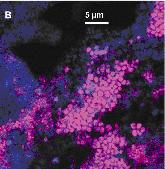Accumulibacter: Difference between revisions
| Line 17: | Line 17: | ||
=Ecology and Significance= | =Ecology and Significance= | ||
Accumulibacter is mostly found in wastewater treatment plants where it acts as a polyphosphate-accumulating bacteria. It is one of the few microbes that can remove excess phosphorus from wastewater. | Accumulibacter is mostly found in wastewater treatment plants where it acts as a polyphosphate-accumulating bacteria. It is one of the few microbes that can remove excess phosphorus from wastewater. In the wastewater treatment facilities it uses a method known as Enhanced Biological Phosphorus Removal (EBPR). This method | ||
=Genome Structure= | =Genome Structure= | ||
Revision as of 22:19, 13 May 2015
Classification
Kingdom: Bacteria
Phylum: Proteobacteria
Class: Betaproteobacteria
Order: unclassified Betaproteobacteria
Family: Candidatus Accumulibacter
Description
Not much is know about Accumulibacter besides the fact that it is a polyphosphate-accumulating organism. Through sequencing scientists haven't even been able to determine which Order Accumulibacter is from.
Ecology and Significance
Accumulibacter is mostly found in wastewater treatment plants where it acts as a polyphosphate-accumulating bacteria. It is one of the few microbes that can remove excess phosphorus from wastewater. In the wastewater treatment facilities it uses a method known as Enhanced Biological Phosphorus Removal (EBPR). This method
Genome Structure
Not much is know about the genome of Accumulibacter as the have been no successful attempts to culture this bacteria and thus no way to sequence the DNA. This has resulted in not even the Order of this microbe being able to be identified.
Metabolism
References
[1] Golyshin, Peter N. “Genome Sequence Completed of Alcanivorax borkumensis, a Hydrocarbon-degrading Bacterium That Plays a Global Role in Oil Removal from Marine Systems.” 3 (2003): 215-20. Print.
Figures
[1F]
[1] [2F] [2] [3F] [3] [4F] [4] [5F] [Original Figure. Author: Pawan Dhaliwal] [6F]
http://microbewiki.kenyon.edu/index.php/File:Lorenzo.gif
[7F] [5]
Author
Page authored by Lukas Waldmann, student of Prof. Katherine Mcmahon at University of Wisconsin - Madison.

